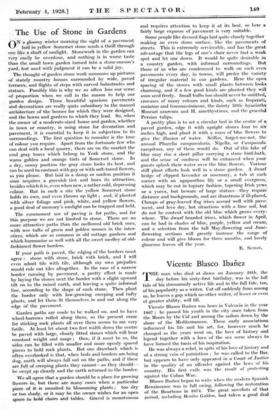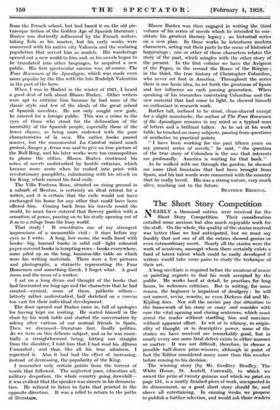Vicente Blasco Ibatiez
THE man who died at dawn on January 28th, the. day before his sixty-first birthday, was in the full tide of his strenuously active life and in the full tide, too, of his popularity as a writer. Cut off suddenly from among us, he leaves a gap which no other writer, of lesser or even of greater ability, will fill.
Vicente Blasco Ibanez was born in Valencia in the year 1867; he passed his youth in the city once taken from the Moors by the Cid and among the sailors down, by the shore of the Mediterranean. These early associations influenced his life and his art, for, however much he changed as the years went on, the love of history and legend together with a love of the sea seem always to have formed the basis of his inspiration.
He was always a rebel, in spite of his love of history and of a strong vein of patriotism ; he was called to the Bar, but appears to have only appeared in a Court of Justice in the quality of an offender against the laws of his country. His first exile was the result of protesting against the Cuban War. Blasco Ibanez began to write when the modern Spanish Renaissance was in full swing, following the restoration of the Bourbons in 1874. The great novelists of that period, including Benito Galdos, had taken a good deal from the French school, but had based it on the old pic- turesque fiction of the Golden Age of Spanish literature ; Ibanez was distinctly influenced by the French writers, taking Zola as his master, but his early works were concerned with his native city Valencia and the seafaring population that served him as models. His wanderings opened out a new world to him and, as his novels began to be translated into other languages, he acquired a new public. His first spectacular success was, of course, The Four Horsemen of the Apocalypse, which was made even more popular by the film with the late Rudolph Valentino in the part of the hero.
When I was in Madrid in the winter of 1921, I heard a good deal of talk about Blasco Ibanez. Other writers were apt to criticize him because he had none of the classic style and few of the ideals of the great school of Spanish novelists. He not only sought new gods, he catered for a foreign public. This was a crime in the eyes of those who stood for the delineation of the mentality of the Spanish people, especially those of the lower classes, as being more endowed with the pure characteristics of la rata. His earlier books passed muster, but the monumental La Catedral raised much protest, Sangre y Arena was said to give no true picture of the Bull Ring, and his later works were too cosmopolitan to please the critics. Blasco Ibanez continued his series of novels undisturbed by hostile criticism, which became more acute when he rushed into print with revolutionary pamphlets, culminating with his attack on his King, which caused his final exile.
The Villa Fontana Rosa, situated on rising ground in a suburb of Menton, is certainly an ideal retreat for a writer, and it is certain that the exile would not have exchanged his home for any other that could have been offered him. Coming back from his travels round the world, he must have entered that flowery garden with a sensation of peace, passing on to his study opening out of it as to a refuge from the busy world.
That study ! It constitutes one of my strongest impressions of a memorable visit ; it rises before my eyes as I write. A long, low room, the walls lined with books—big, learned books in solid calf—light coloured paper-covered books in tempting rows—books everywhere, some piled up on the long, business-like table on which Were his writing materials. There were a few pictures and photographs, a statuette representing the Four Horsemen and something Greek, I forget what. A good room and the room of a worker.
I sat on a long divan and thought of the books that had fascinated me long ago and the characters that he had created—cynical, some of them, pathetic others— latterly rather understudied, half sketched on a canvas too vast for their individual development.
The door opened and Ibanez came in, full of apologies for having kept me waiting. He seated himself in the chair by his work table and started the conversation by asking after various of our mutual friends in Spain. Then we discussed—literature first, finally politics. As we were on this delicate subject, and as he was essen- tially a straightforward being, hitting out straight from the shoulder, I told him that I had read his Alfonso Unmasked ; and that, like all his true admirers, I regretted it. Also it had had the effect of increasing, • instead 'of decreasing, the popularity of the King.
I remember only certain points from the torrent of words that followed. The neglected poor, education nil, military despotism, the whole country going downhill— it was evident that the speaker was sincere in his denuncia- tion. He refused to listen to facts that pointed in the opposite direction. It was a relief to return to the paths of literature. Blasco Ibanez was then engaged in writing the third volume of his series of novels which he intended to con- stitute his greatest literary legacy ; an historical series On a new plan. In these works he introduces modern characters, acting out their parts in the scene of historical happenings ; one or other of these characters relates the story of the pait, which mingles with the other story of the present. In the first volume we have the Avignon' of the Popes, in the second the Rome of the Borgias ; in the third, the true history of Christopher Columbus, who never set foot in America. Throughout the series there is one basic idea, to set forth the greatness of Spain and her influence on each passing generation. When speaking of his researches concerning Columbus and the new material that had come to light, he showed himself an enthusiast in research work.
Rather tall, inclined to be stout, clean-shaved except for a slight moustache, the author of The Four Horsemen of the Apocalypse remains in my mind as a typical man of letters and a brilliant talker. As he sat at his work table, he touched on many subjects, passing from questions of aesthetics to practical points.
" I have been working for the past fifteen years on my present series of novels," he. said, " the question of the true story of Columbus is the one that interests me profoundly. America is waiting for that book."
As he walked with me through the garden, he showed me some tiled fountains that had been brought from Spain, and his last words were connected with the country that he really loved. His was a strong nature, very much alive, reaching out to the future.
BEATRICE ERSKINE.







































 Previous page
Previous page